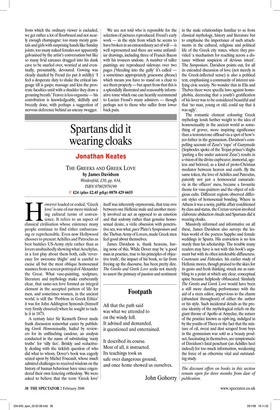Spartans did it wearing cloaks
Jonathan Keates
THE GREEKS AND GREEK LOVE by James Davidson Weidenfeld, £30, pp. 634, ISBN 97802978199 ✆ £24 (plus £2.45 p&p) 0870 429 6655 However loaded or coded, ‘Greek love’ is one of our more misleading cultural terms of convenience. It refers to an aspect of classical civilisation whose existence many people continue to find either embarrassing or reprehensible. Even now Hollywood chooses to present Achilles and Patroclus as best buddies US-Army style rather than as lovers unabashedly showing what Aeschylus, in a lost play about them both, calls ‘reverence for awesome thighs’ and is careful to excise all but the most oblique homosexual nuances from a screen portrayal of Alexander the Great. What vase-painting, sculpture, literature and mythology make exuberantly clear, that same-sex love formed an integral element in the accepted pattern of life for men, and sometimes women, in the ancient world, is still the ‘Problem in Greek Ethics’ it was for John Addington Symonds (himself very firmly closeted) when he sought to tackle it in 1873.
A century later Sir Kenneth Dover made frank discussion somewhat easier by publishing Greek Homosexuality, hailed by reviewers for its unflinching candour, an analysis conducted in the name of substituting ‘nasty truths’ for ‘silly lies’. Briskly and reductively dealing with the ticklish question of who did what to whom, Dover’s book was eagerly seized upon by Michel Foucault, whose much admired challenges to received wisdom on the history of human behaviour have since engendered their own festering orthodoxy. We were asked to believe that the term ‘Greek love’ itself was inherently oxymoronic, that true eros between one Hellenic male and another merely involved an act as opposed to an emotion and that sodomy rather than genuine homosexual desire, a virile obsession with penetrative sex, was what, pace Plato’s Symposium and the Theban Army of Lovers, made Greek men feel good about themselves.
James Davidson is, thank heavens, having none of this. While Dover may be ‘a good man in practice, true to his principles of objective truth’, the impact of his book, so far from freeing up the discourse, has been pretty dire. The Greeks and Greek Love seeks not merely to assert the primacy of passion and sentiment in the male relationships familiar to us from classical mythology, history and literature but to emphasise the importance of such attachments in the cultural, religious and political life of the Greek city states, where they provided ‘a mechanism for reaching across a distance without suspicion of devious intent’. The Symposium, Davidson points out, for all its extended discussion of love (not merely in the Greek-inflected sense) is also a political text, emphasising a community of interest unifying civic society. No wonder that in Elis and Thebes there were specific laws against homophobia, decreeing that a youth’s gratification of his lover was to be considered beautiful and that ‘no man, young or old, could say that it was ugly’.
The romantic element colouring Greek mythology lends further weight to the idea of homosexuality in the ancient world as something of graver, more inspiring significance than a testosterone offload via a spot of how’syer-father in the gymnasium. Davidson’s compelling account of Zeus’s ‘rape’ of Ganymede (Sophocles spoke of the Trojan prince’s thighs ‘putting a fire under autocrat Zeus’) results in a vision of the divine cupbearer, immortal, ageless and beloved, as a kind of proto-Christian mediator between heaven and earth. By the same token, the love of Achilles and Patroclus, patently not just a homosocial camaraderie in the officers’ mess, became a favourite theme for vase-painters and the object of religious cults. Different regions observed different styles of homosexual bonding. Where in Athens it was a noisy, public affair conditioned by class and status, the Cretan version involved elaborate abduction rituals and Spartans did it wearing cloaks.
Massively informed and informative on all these, James Davidson also surveys the lesbian world of the poetess Sappho and female weddings in Sparta. His conviction is no less sturdy than his scholarship. The trouble many readers may have is not with this book’s argument but with its often intolerable diffuseness. Courtesans and Fishcakes, his earlier study of Hellenic mores, though praised to the skies for its gusto and fresh thinking, struck me as rambling to a point at which any clear, conceptual spine became helplessly obfuscated. Similarly The Greeks and Greek Love would have been a still more dazzling performance with the aid of a stern editor, impervious to the charm (abundant throughout) of either the author or his style. Such incidental details as the precise identity of the mythological reliefs on the giant throne of Apollo at Amyclae, the nature of the practice known as oiph-ing, indulged in by the youths of Thera or the fact that the mixture of oil, sweat and dust scraped from boys in the gymnasium was sold as a beauty product, fascinating in themselves, are symptomatic of Davidson’s fatal penchant (an Achilles heel indeed) for too much information, weakening the force of an otherwise vital and outstanding study.
The discount offers on books in this section remain open for three months from date of publication.


































































 Previous page
Previous page